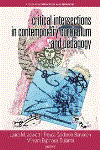
Critical Intersections In Contemporary Curriculum & Pedagogy
Edited by:
Laura Jewett, University of Texas Rio Grande Valley
Freyca Calderon-Berumen, Pennsylvania State University
Miryam Espinosa-Dulanto, University of Texas Rio Grande Valley
A volume in the series: Curriculum and Pedagogy. Editor(s): The Curriculum and Pedagogy Group.
Published 2018
This volume offers a collection of scholarship that extends curricular conversations, crosses borders of praxis, and expands democratic, critical and aesthetic imaginaries toward the ends of lending momentum to the ever-present and wide-open question: What is to be done— in terms of curriculum and pedagogy— in P-12 schools, in teacher education and other higher education contexts, in communities, as well as within our own lives as teachers, leaders and learners? These chapters represent perspectives from curriculum workers/teachers/scholars/activists across theoretical landscapes and spanning a diversity of positionalities within critical intersections of power and privilege as they relate to identity, culture and curriculum as well as to social justice, schools and society.
CONTENTS
SECTION I: NURTURING CRITICAL CONVERSATIONS OF CURRICULUM AND PEDAGOGY. Disrupting Teacher Education: The Rise Of Independent Teacher Credentialing Programs, Kris Sloan. Daylight Nightmare: A Contending Pressure To Defend And Negotiate Canadian-Muslim Identity On The School Landscape, Momina Khan. Centering The Voices Of Teacher Candidates Of Color To Inform Racially-Just Educational Spaces, Robbie Burnett and Beth Beschorner. Decolonization: A Metaphorical Conundrum, Manisha Sharma. Teaching Black Social Movements Through #Blacklivesmatter: Twitter As A Lab, Knowledge Bank, And Field, Kevin Winstead, and Wendy Marie Laybourn. Challenges And Possibilities Of Intersectionality In The Education Of English Language Learners, Rachel Grant and Gertrude Tinker Sachs. Dying White People In Dead White Schools, Samuel Jaye Tanner. SECTION II: FOSTERING PEDAGOGICAL BORDER CROSSINGS AND CRITICAL CURRICULUM IMAGINARIES. Educational Change And The Participation Of Families In Schools From A Critical Intercultural Approach: The Case Of Spain, Inmaculada Antolínez-Domínguez, Esther Márquez-Lepe, and María García-Cano Torrico. Las Traviesas: Critical Feminist Educators In Their Struggle For Critical Teaching, Brian Gibbs. English Teachers’ Narratives In The Midst Of Sacred Curriculum Stories, Candace Schlein, Sara Crump, and Christa Wenger. Preservice Teachers’ Exploration Of Imaginary Futures: Using A Novel To Cross Borders Of Space, Time, And Matter In A Multicultural Education Course, Tammy Mills and Rebecca Buchanan. It Takes A Nation Of Millions: How To Freestyle A Hip Hop Curriculum, Frederick W. Gooding Jr. and T. Mark Montoya. Social Justice In Service-Learning And Community Engagement: A Conversation About Meanings, Practices, And Possibilities, Leslie Garvin, Patricia Bricker, Margaret M. Commins, Spoma Jovanovic, Kelly Misiak, Lane Perry, Sarah E. Stanlick, Elizabeth Wall-Bassett, Catherine Wright, and Patti H. Clayton. A Currere Of Maintaining Mental Health As An Administrator Through A Reflective-Practice, Arts-Based Inquiry, Joe Norris. SECTION III: EMBODYING POSSIBILITIES IN LIVING CURRICULUM. Embracing Complexities, Contradictions And Plurality: Three Voices From A Hispanic-Serving Institution At The Frontera, Karin A. Lewis, Miryam Espinosa-Dulanto, and Vejoya Viren. Criando Y Creando: Latina Mothers In Academia, Freyca Calderon-Berumen and Karla O’donald. Faraway Eyes: A Lived Curriculum Of Daughter Care, Laura M. Jewett and Zulema Williams. Identity, Fluidity, Empowerment, And Engendered Poverty: Performing A Veteran-Latina-Online-Graduate Student, Maricela Burns. Sober Awakening: Transcending The Paralysis Of Perfection Through A Practice Of Acceptance, Sarah K. Mackenzie-Dawson. Unquiet Complexion, Eva Rose B. Washburn-Repollo. Not A War Zone, Sarrah Grubb.
-
Paperback978-1-64113-423-1
Web price: $45.04 (Reg. 52.99)
-
Hardcover978-1-64113-424-8
Web price: $80.74 (Reg. 94.99)
- eBook978-1-64113-425-5

-
 BIPOC Alliances
Building Communities and Curricula
BIPOC Alliances
Building Communities and Curricula
-
 Collective Unravelings of the Hegemonic Web
Collective Unravelings of the Hegemonic Web
-
 Ideating Pedagogy in Troubled Times
Approaches to Identity, Theory, Teaching and Research
Ideating Pedagogy in Troubled Times
Approaches to Identity, Theory, Teaching and Research
-
 Liminal Spaces and Call for Praxis(ing)
Liminal Spaces and Call for Praxis(ing)
-
 Making A Spectacle
Examining Curriculum/Pedagogy as Recovery From Political Trauma
Making A Spectacle
Examining Curriculum/Pedagogy as Recovery From Political Trauma
-
 The Kaleidoscope of Lived Curricula
Learning Through a Confluence of Crises 13th Annual Curriculum & Pedagogy Group 2021 Edited Collection
The Kaleidoscope of Lived Curricula
Learning Through a Confluence of Crises 13th Annual Curriculum & Pedagogy Group 2021 Edited Collection
-
 Who Are You Without Colonialism?
Pedagogies of Liberation
Who Are You Without Colonialism?
Pedagogies of Liberation

